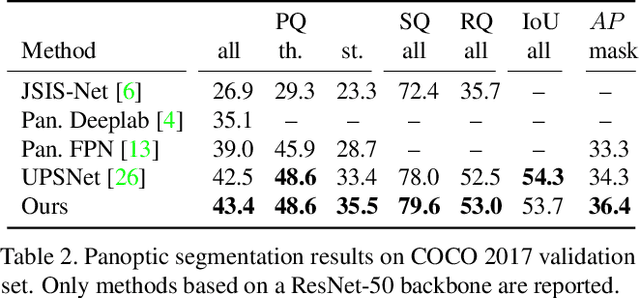Unifying Training and Inference for Panoptic Segmentation
Paper and Code
Jan 14, 2020



We present an end-to-end network to bridge the gap between training and inference pipeline for panoptic segmentation, a task that seeks to partition an image into semantic regions for "stuff" and object instances for "things". In contrast to recent works, our network exploits a parametrised, yet lightweight panoptic segmentation submodule, powered by an end-to-end learnt dense instance affinity, to capture the probability that any pair of pixels belong to the same instance. This panoptic submodule gives rise to a novel propagation mechanism for panoptic logits and enables the network to output a coherent panoptic segmentation map for both "stuff" and "thing" classes, without any post-processing. Reaping the benefits of end-to-end training, our full system sets new records on the popular street scene dataset, Cityscapes, achieving 61.4 PQ with a ResNet-50 backbone using only the fine annotations. On the challenging COCO dataset, our ResNet-50-based network also delivers state-of-the-art accuracy of 43.4 PQ. Moreover, our network flexibly works with and without object mask cues, performing competitively under both settings, which is of interest for applications with computation budgets.
 Add to Chrome
Add to Chrome Add to Firefox
Add to Firefox Add to Edge
Add to Edge